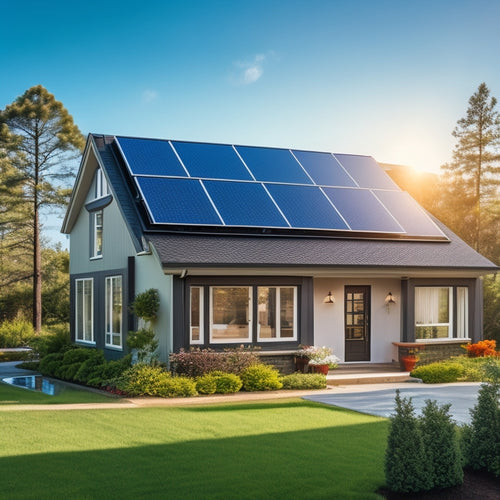
5 Best Off-Grid Power Systems for Your Vehicle
Share
When selecting an off-grid power system for your vehicle, contemplate your energy needs, vehicle size, and personal preferences. Solar-powered systems are ideal for campervans and RVs, while wind-powered systems suit marine applications or high-wind areas. Hybrid systems combine both. You'll want to prioritize energy efficiency and power reliability. Key features to ponder include depth of discharge, charge controller efficiency, inverter surge capacity, and monitoring and control systems. By choosing the right system and following installation and maintenance tips, you'll achieve vehicle autonomy. To find the perfect system for your needs, explore the top off-grid power system options and get ready to take your vehicle off the grid.
Key Takeaways
• Consider your energy needs, vehicle size, and personal preferences when choosing an off-grid power system for your vehicle.
• Solar-powered systems are ideal for campervans and RVs, while wind-powered systems are better suited for marine applications or areas with high wind speeds.
• Hybrid systems combine solar and wind power for a reliable and efficient off-grid power solution.
• Look for systems with high charge controller efficiency, adequate inverter surge capacity, and advanced monitoring and control systems.
• Renogy, Goal Zero, HQST, and WindyNation offer top-rated off-grid power systems with varying features and price points to suit different needs and budgets.
Top Off-Grid Power System Options
You have several top off-grid power system options to choose from, each with its own strengths and weaknesses, including solar-powered, wind-powered, and hybrid systems.
When adopting an off-grid lifestyle, it's important to select a power system that integrates seamlessly with your vehicle. Solar-powered systems, for instance, are ideal for campervans and RVs, as they provide a quiet and eco-friendly source of energy.
On the other hand, wind-powered systems are better suited for marine applications or areas with high wind speeds. Hybrid systems, which combine solar and wind power, offer the best of both worlds.
When choosing an off-grid power system, consider your energy needs, vehicle size, and personal preferences. Will you be living off-grid full-time or just on weekends? Do you need to power appliances, lights, or computers?
Key Features to Consider When Buying
When selecting an off-grid power system, it's vital to evaluate several key features that directly impact the system's performance, reliability, and overall suitability for your vehicle.
You'll want to prioritize energy efficiency, as it directly affects your system's overall performance. A system with high energy efficiency will provide more power while minimizing energy waste. Additionally, power reliability is important, as it guarantees your system can handle the demands of your vehicle's appliances.
Here are some key features to take into account when buying an off-grid power system:
-
Depth of Discharge (DOD): A higher DOD means you can use more of your battery's capacity, reducing the need for frequent recharging.
-
Charge Controller Efficiency: A high-efficiency charge controller ensures maximum energy harvesting from your solar panels or other power sources.
-
Inverter Surge Capacity: A higher surge capacity allows your system to handle brief, high-power demands from appliances like microwaves or power tools.
- Monitoring and Control Systems: A detailed monitoring system helps you track your energy usage, storage, and generation, ensuring your system operates efficiently.
Best Solar Panel Systems Compared
Among the top contenders for off-grid power systems, four solar panel systems stand out for their impressive performance, reliability, and overall value, making them worth exploring in detail. You're likely wondering which one will give you the most bang for your buck (or should we say, watt for your buck?).
Let's delve into the comparison of these top solar panel systems.
Renogy's 100W Monocrystalline Solar Panel is a popular choice for camping enthusiasts, offering efficient portable charging for your camping essentials.
Goal Zero's Nomad 100 Solar Panel is another top contender, boasting a durable design and easy setup.
HQST's 100W Solar Panel is another strong competitor, providing a high-efficiency rating and a budget-friendly price tag.
Last but not least, WindyNation's 100W Solar Panel offers a high-capacity battery and impressive charging speed.
When choosing the best solar panel system for your vehicle, consider your specific needs, such as the size of your battery, desired charging speed, and overall budget. By weighing these factors, you'll be well on your way to finding the perfect off-grid power system for your next adventure.
Installation and Maintenance Tips
Proper installation and routine maintenance are vital to ensuring your chosen solar panel system operates at peak efficiency and extends its lifespan. You wouldn't want your off-grid power system to be a hot mess, would you?
To avoid that, follow these essential installation and maintenance tips:
Installation Essentials
- Wiring Essentials: Ensure your wiring is sized correctly to handle the power output of your solar panel system. Don't risk an electrical fire!
- Battery Care: Keep your batteries clean, secure, and at the right temperature to prolong their lifespan.
- Shading is a No-No: Avoid shading your solar panels, as it can greatly reduce energy production.
- Monitor and Adjust: Regularly monitor your system's performance and adjust as needed to optimize energy output.
Powering Your Vehicle Off the Grid
By integrating your off-grid power system with your vehicle's electrical system, you can power your vehicle's appliances and accessories reliably and efficiently, even when venturing far from traditional power sources.
This means you can enjoy the freedom of remote exploration without worrying about running out of juice.
With a well-designed off-grid power system, you can achieve vehicle autonomy, where your ride becomes a self-sustaining unit that can operate independently for extended periods.
Frequently Asked Questions
Can I Use an Off-Grid Power System in Extreme Weather Conditions?
When venturing into extreme weather conditions, you'll want to confirm that your off-grid power system can withstand temperature fluctuations and harsh weather resistance, so choose components that can handle the beating, or you'll be left in the dark!
Are Off-Grid Power Systems Compatible With All Vehicle Types?
When selecting an off-grid power system, you'll find that compatibility largely depends on your vehicle's classification and electrical upgrades - don't worry, most systems adapt to various types, but it's essential to check your ride's specs before making the switch.
How Long Does It Take to Fully Charge My Batteries?
"When you're wondering how long it takes to fully charge your batteries, consider your battery health and charging speed - typically, it takes 2-5 hours with a healthy battery and fast charger, but it can vary depending on your setup."
Can I Use My Off-Grid Power System to Power Appliances Indoors?
When powering appliances indoors with your off-grid system, prioritize Indoor Safety by ensuring proper Power Distribution to avoid electrical hazards; you'll be relieved you did, and your appliances will thank you (silently, of course).
Do Off-Grid Power Systems Require Regular Battery Replacement?
You'll be relieved to know that off-grid power systems don't require frequent battery replacements, as a well-maintained battery can last around 5-7 years, keeping your maintenance costs in check and your wallet happy.
Related Posts
-

Safety First: Why Seniors Need Advanced Vehicle Features
As you get behind the wheel, you're likely unaware that seniors are 16% more likely to be involved in a fatal car cra...
-

10 Best Ways to Purify Urban Air With EVS
You're looking for ways to purify urban air with Electric Vehicles (EVs). You can start by incorporating EVS Air Filt...
-

Solar Power Units Perfect for Homes
You're considering installing a solar power unit in your home, a decision that can notably reduce your reliance on tr...


